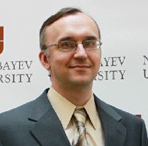
Research Interest
Judicial profession in Kazakhstan; Judicial behavior outside the courthouses
Born in Syktyvkar, Russia, Dr. Alexei Trochev (PhD, University of Toronto; MPA, University of Kansas; Law, Syktyvkar State University) teaches Political Science Research Methods, International Law, and Law, Politics, and Society, and Post-Soviet Public Policy. Prior to that, he taught political science and law courses at the University of Wisconsin-Madison, Queen’s University in Kingston, Canada and the Pomor State University in Arkhangelsk, Russia. He also edits the journal “Statutes and Decisions: The Laws of the USSR and Its Successor States,” which has recently covered issues of police reform in Kyrgyzstan, and administrative justice in Uzbekistan. His current research focuses on transitional justice in post-Soviet states. In one three-year project, called “In the GULAG’s Shadow: Producing, Consuming & Perceiving Prisons in the Former Soviet Union” and funded by the Economic and Social Research Council, he serves as a collaborator in the team of researchers from the University of Strathclyde and the Higher School of Economics. His other project deals with the questions of how and why some post-Soviet states chose to ban Communist parties through courts while others did not.
Books
Judging Russia: The Role of the Constitutional Court in Russian Politics, 1990-2006 (New York: Cambridge University Press, 2008; paperback edition 2011).
Конституционное правосудие в действии: опыт России и Канады [Constitutional Justice in Action: Russian and Canadian Experiences]. Co-edited with Peter H. Solomon, Jr. (Moscow: Novaia iustitsiia, 2008). In Russian.
Journal Articles
1. Judges and Their Allies: Rethinking Judicial Autonomy through the Prism of Off-Bench Resistance. Co-authored with Rachel Ellett. Journal of Law and Courts 2:1 (Spring 2014): 67-91.
2. Suing Russia at Home. Problems of Post-Communism 59:5 (September–October 2012): 18-34.
3. Meddling with Justice: Competitive Politics, Impunity, and Distrusted Courts in Post-Orange Ukraine. Demokratizatsiya: The Journal of Post-Soviet Democratization 18:2 (Spring 2010): 122-147.
4. The Unification of Law in the Russian Federation. Co-authored with Jeffrey Kahn & Nikolay Balayan. Post-Soviet Affairs 25:4 (October-December 2009): 310-346.
5. All Appeals Lead to Strasbourg? Unpacking the Impact of the European Court of Human Rights on Russia. Demokratizatsiya: The Journal of Post-Soviet Democratization 17:2 (2009): 145-178.
6. Russia’s War between the Courts: The Struggle over the Jurisdictional Boundary between the Constitutional Court and Regular Courts. Co-authored with William Burnham. American Journal of Comparative Law 55:3 (2007): 381-452.
7. Less Democracy, More Courts: The Puzzle of Judicial Review in Russia. Law & Society Review 38:3 (2004): 513-548.
8. Ukraine: Constitutional Court Invalidates the 1991 Ban on the Communist Party. I • CON: International Journal of Constitutional Law 1:3 (2003): 534-540.
9. Implementing Russian Constitutional Court Decisions. East European Constitutional Review 11 (Winter/Spring 2002): 95-103.
Book Chapters
1. Legitimacy, Accountability and Discretion of the Russian Courts. In Politics and Legitimacy in Post-Soviet Eurasia, Martin Brusis, Joachim Ahrens, Martin Schulze Wessel (Palgrave, 2015), 121-147.
2. How Judges Arrest and Acquit: Soviet Legacies in Post-Communist Criminal Justice. In The Historical Legacies of Communism in Russia and Eastern Europe, ed. Mark Beissinger & Stephen Kotkin (Cambridge UP, 2014), 152-178.
3. Fragmentation? Defection? Legitimacy? Explaining Judicial Roles in Post-Communist ‘Colored Revolutions.’ In Consequential Courts: Judicial Roles in Global Perspective, ed. Robert A. Kagan et al. (Cambridge UP, 2013), 67-92.
4. Ukraine. In Encyclopedia of Transitional Justice, ed. Lavinia Stan & Nadya Nedelsky (Cambridge UP, 2013), 490-497.
5. Can Weak States Have Strong Courts? Evidence from Russia. In Legitimacy, Legal Development & Change: Law & Modernization Reconsidered, ed. David Linnan (Ashgate, 2012), 351-374.
6. Federal Idea in Putin’s Russia. In The Federal Idea: Essays in Honour of Ronald L. Watts, ed. Thomas J. Courchene et al. (McGill-Queen’s UP, 2011), 445-460.
7. New Court in a New Federation: The Constitutional Court and Russian Federalism. In Judge Made Federalism? The Role of Courts in Federal Systems, ed. Hans-Peter Schneider, Jutta Kramer, & Beniamino Caravita di Toritto (Nomos, 2009), 107-130.
8. Judge-Made Federalism in Canada. In Judge made Federalism? The Role of Courts in Federal Systems, ed. Hans-Peter Schneider, Jutta Kramer, & Beniamino Caravita di Toritto (Nomos, 2009), 163-178.
9. Judicial Self-Empowerment under Authoritarian Rule: The Case of the Russian Constitutional Court. In Essays in Honour of Anders Fogelklou, ed. Stefan Hedlund and Torben Spaak (Iustus Förlag, 2008), 287-312.
10. Russia’s Constitutional Spirit: Judge-Made Principles in Theory and Practice. In Russia and Its Constitution: Promise and Political Reality, ed. Robert Sharlet and Gordon B. Smith (Martinus Nijhoff, 2007), 51-75.
11. ‘Tinkering with Tenure’: The Russian Constitutional Court in Comparative Perspective. In Russia, Europe, & the Rule of Law, ed. Ferdinand Feldbrugge (Martinus Nijhoff, 2007), 47-77.
12. Courts on the Web in Russia. In E-Justice: Using Information Communication Technologies in the Court System, ed. Agustí Cerrillo i Martínez and Pere Fabra i Abat (Idea Group, 2008), 196-202.
13. Judicial Selection in Russia: Towards Accountability & Centralization. In Appointing Judges in an Age of Judicial Power: Critical Perspectives from Around the World, ed. Peter H. Russell and Kate Malleson (U of Toronto Press, 2006), 375-394.
14. Courts and Federalism in Putin’s Russia. Co-authored with Peter H. Solomon, Jr. In The Dynamics of Russian Politics. Vol. 2, ed. Peter Reddaway and Robert W. Orttung (Rowman & Littlefield, 2005), 91-121.
PLS210 Political Science Research Methods; PLS354 Introduction to International Law; PLS370 Law, Politics and Society; PLS372 Post-Soviet Public Policy; PLS511 Advanced Research Design. Click here to see the syllabi.



